Lyle and Erik Menendez end nearly three decades of silence in the new Netflix documentary, The Menendez Brothers. From the Donovan Correctional Facility in California, they address what they call misconceptions surrounding their parents’ murder and explain how they got “washed” in Trial Two.
Lyle, then 21, and Erik, then 18, admitted to fatally shooting their parents in the famous case, but said that they were acting out of fear that their father, who they said had sexually abused Erik for years, was about to kill them to keep the abuse a secret.
IMDb
The brothers shot their father, José Menendez, and their mother, Kitty Menendez, a total of 14 times, reloading the gun during the attack in their Beverly Hills home.
Police arrested Lyle and Erik on March 8, 1990, for murdering their parents on August 20, 1989, seven months earlier.
According to the documentary, while the brothers were in prison, the Los Angeles Police Department released a statement alleging they attempted to escape. In response, the sheriff’s department conducted a search of their cells in the summer of 1990.
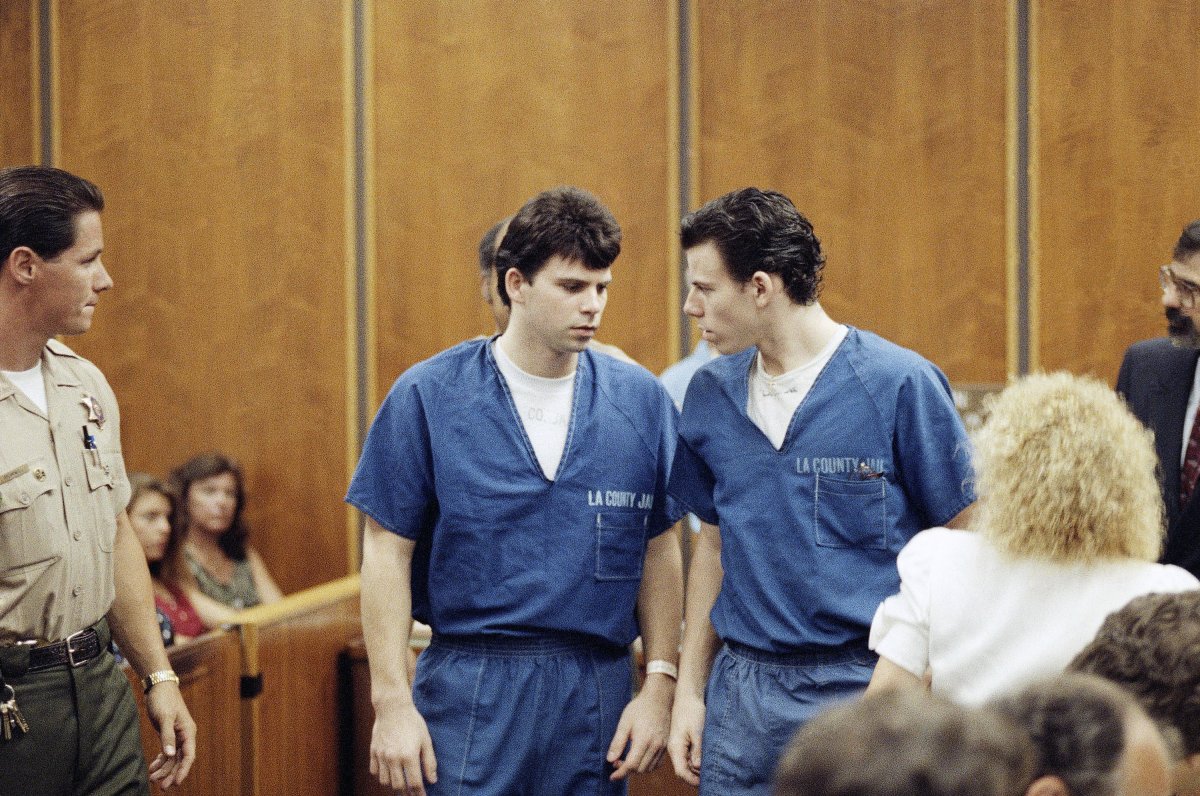
Nick Ut/AP Photo
During the search, deputies discovered a 17-page letter Lyle had written to Erik, detailing everything that had happened to them, including the horrific murders. At the end of the letter, Lyle wrote, “Please. Destroy.”
Erik was supposed to destroy the letter, but he explained in the documentary Lyle rarely expressed his emotions, and the letter was a rare glimpse into his pain. Unable to throw it away, Erik kept it.
“Ultimately it became clear, particularly after they found that jail letter that there was no way around saying what happened,” Lyle said in the documentary. “Because they had that note, they had a confession that we were responsible for my parents death.”
After the letter was discovered, the brothers confessed not only to the public but also to their family and friends that they had killed their parents.
“Having them have to relive not just my parent’s death but now knowing that we were responsible was heartbreaking and really a tragically painful conversation,” Erik said.
The Distinction Between the First and Second Trials
Initially, the brothers blamed the mob on their parents’ killing, citing their father’s connections as a high profile entertainment executive, but the brutal nature of the crime suggested to law enforcement a more personal and emotionally driven motive.
Erik’s confession to psychologist Jerome Oziel and the discovery of Lyle’s letter brought the case to a pivotal turning point.

Nick Ut/AP Photo
Veteran Menendez reporter Robert Rand told Newsweek Erik confessed to Oziel, revealing the dark truth behind the murders of Kitty and Jose, and Lyle was called to the therapist’s office to corroborate on October 31, 1989.
After about an hour, Lyle told Erik they were leaving, adding he would no longer speak with Oziel. Just before stepping into the elevator, Lyle shook hands with the doctor and wished him, “Good luck,” a gesture Oziel said he interpreted as a threat.
Oziel confided in his girlfriend, Judalon Smyth, about the confession. Several months later, Smyth went to the police with the alleged details of the murders.
In the first Menendez brothers’ trial, which began in 1993, Lyle and Erik were charged with the 1989 murders of their parents. The trial ended with two deadlocked juries, unable to agree on whether the brothers were guilty of murder or acted out of fear. This led to a mistrial on January 28, 1994, and set the stage for a second trial in 1995.
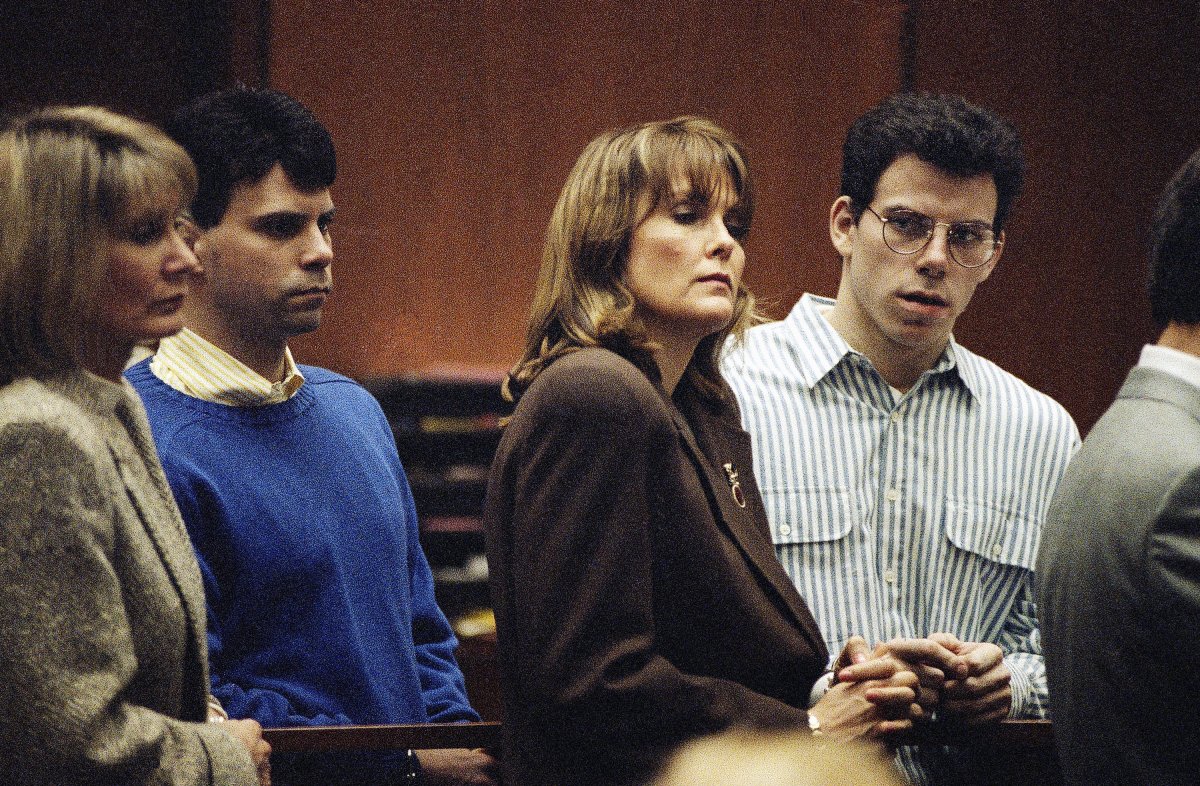
Nick Ut/AP Photo
After Rand investigated numerous leads and interviewed almost everyone involved—family members, lawyers, law enforcement officers, and jurors—he reported that the male jurors decided to convict the brothers of murder rather than manslaughter, saying that they believed a father would never do such harm to his sons.
Many people, including Kim Kardashian, believe the brothers did not receive a fair chance during their second trial.
More than four months after the Menendez mistrials, O.J. Simpson was charged with killing his ex-wife, Nicole Brown Simpson, and her friend Ronald Goldman. Kardashian’s father, Robert Kardashian, served as one of the NFL legend’s defense attorneys. The trial gripped the nation as the world watched live footage from inside the courtrooms for both trials.
Just eight days after Simpson was found not guilty in a highly watched live verdict, the opening arguments kicked off in Lyle and Erik’s second trial.
Mark Geragos, one of the brothers’ attorneys, told Newsweek the District Attorney’s Office was under siege and perceived as unable to secure victories in major cases following the Simpson trial.
“It [Menendez Brothers’ trial] essentially kicked off and became the initial true crime template, drawing global attention. Prosecutors were determined to convict the defendants and ensure Los Angeles would not be seen as a prosecutorial wasteland,” Geragos said.
In a 1996 interview on The Larry King Show, Leslie Abramson, Erik’s defense attorney for both trials, told the talk show host she cried at the Van Nuys courthouse after hearing the Simpson verdict. She said she told the courthouse, “This is bad for the boys and everybody else. It’s going to be payback time.”
“Some people suggested that the timing of the second trial, given that O.J. had just been acquitted, is responsible for the different approach taken by the prosecution and the trial judge,” said Cliff Gardner, one of the brothers’ appellate attorneys.
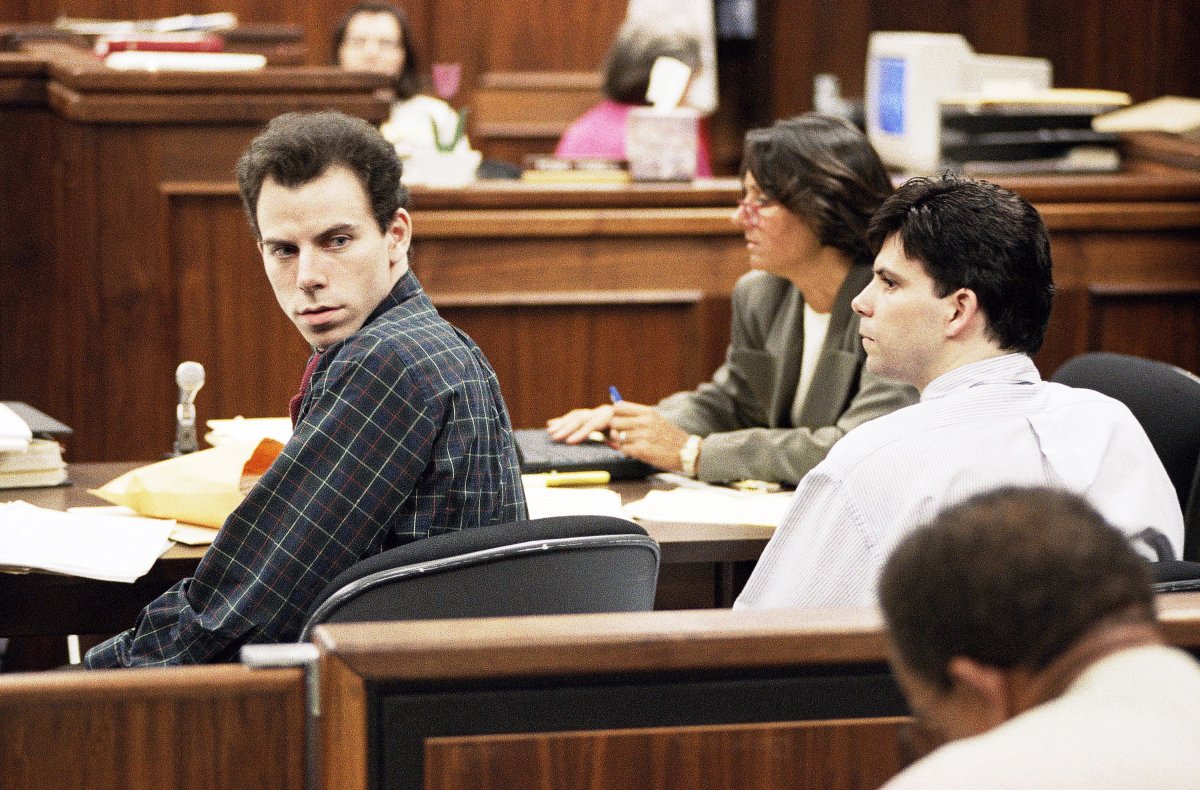
Reed Saxon/AP Photo
Prosecutors argued there was no evidence of the alleged molestation and the judge excluded abuse evidence from the second trial. They said that the sons were motivated by a desire to inherit their parents’ multimillion-dollar estate.
“I didn’t really think it would have the profound effect on the public that it did in terms of backlash against high-profile defendants,” Lyle said. “We got washed in the wake of that.”
“The judge said, ‘Well, Erik and Lyle are not women, so the battered women’s syndrome doesn’t apply.’ So, all that trauma is not relevant and is not allowed in the second trial,” Erik said.
Deborah Tuerkheimer, a former Manhattan prosecutor and author of Credible, told Newsweek boys who are victims of sexual abuse and assault face additional challenges because such cases are less common and often less acknowledged, with these difficulties being even greater decades ago.
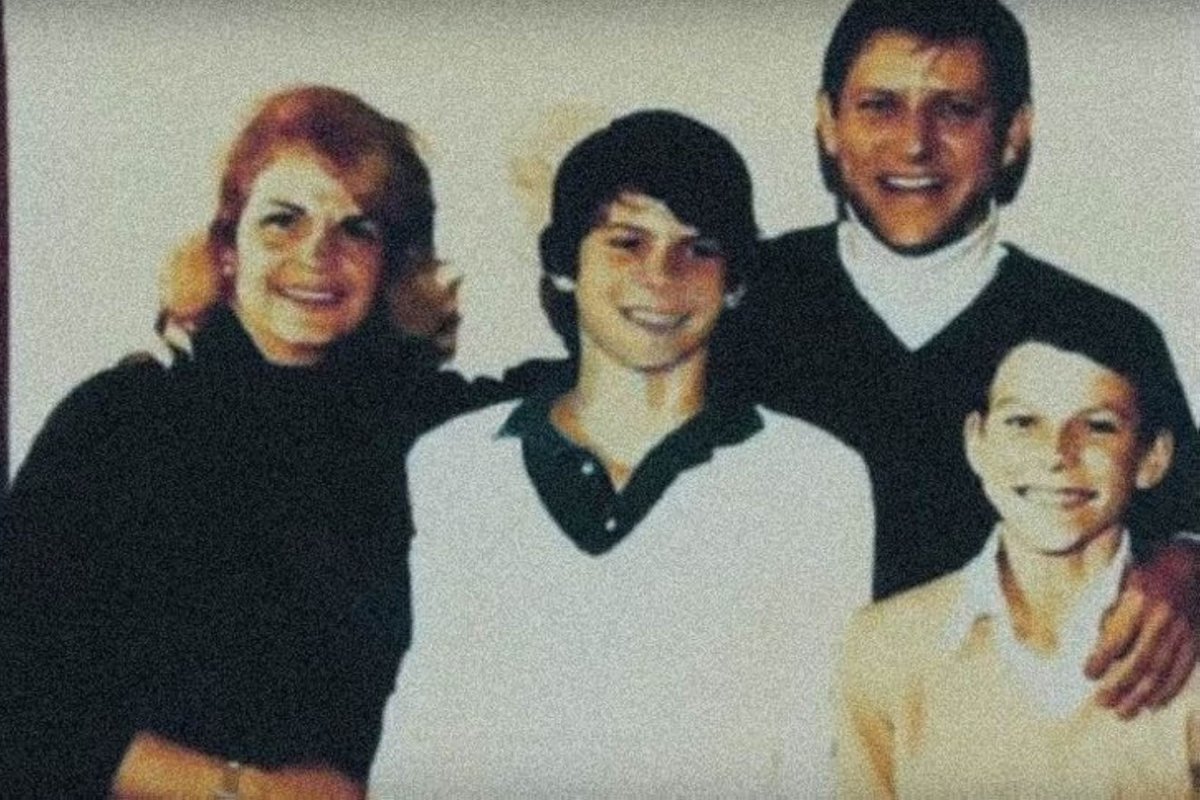
IMDb
“When victims don’t behave or look like we expect them to behave or look, we tend to find them not credible and boys don’t really fit into the popular understanding of who’s a victim of abuse,” the author said.
Jennifer Simmons Kaleba, Vice President of Communications of RAINN told Newsweek not being believed from the beginning can be one of the most damaging experiences for a survivor. The level of belief they receive shapes their entire journey, impacting their chances of achieving legal justice.
On February 2, 1996, the jury convicted both brothers of first-degree murder, and they received life sentences without the possibility of parole. The verdict highlighted the complexity of the case and the differing views on justice and mental health issues in the context of violent crime.
“The second jury convicted the brothers because they saw a completely different trial that was engineered to guarantee murder verdicts,” said Hazel Thornton, a juror in the first trial. “To show them so much less makes it not fair to the brothers.”
Lyle agreed, noting the disparity in going from a hung jury to a unanimous 12-0 verdict.
Where Are the Menendez Brothers Now?
In 2018, officials transferred Lyle from Mule Creek State Prison in Northern California to R.J. Donovan Correctional Facility in San Diego, where they had already placed his brother in a separate unit.
Later, they moved into the same housing unit. Lyle requested the transfer after learning about his brother’s classification status.
“When suddenly this prayer of being able to see my brother again was answered, the joy of seeing him and being able to wrap my arms around him and give him a hug was overwhelming; it was just happiness,” Erik said.
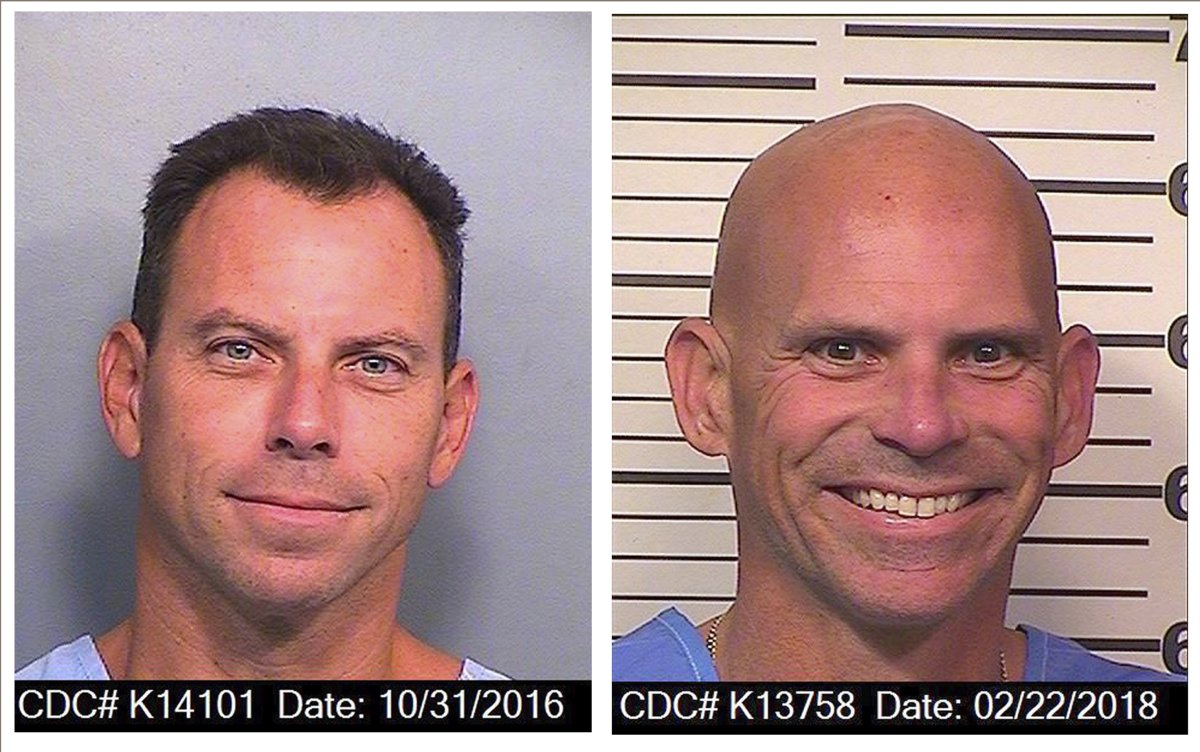
California Department of Corrections and Rehabilitation/AP Photo
Erik also shared that he and Lyle see each other every day and maintain a close bond.
The brothers have also dedicated themselves to raising awareness about male victims of sexual assault during their time in prison.
“Young people have taken the time to figure out what happened, and they understand in a way older people don’t,” Lyle said. “I feel more hope when society seems to understand sexual abuse even better.”
Los Angeles County District Attorney George Gascón spoke to Newsweek about the high-profile Menendez brothers’ case and new evidence not presented in either trial.
Gascón told Newsweek his office is currently reviewing a 1988 letter written by Erik Menendez to his cousin about the alleged sexual abuse he endured by his father. The new evidence also includes a statement from a former Menudo member who claims he was also sexually assaulted by Jose Menendez.
“There are people in my office who believe they should never get any relief, and others who believe they should,” Gascón said. “I have now decided we will go through a thorough process of investigating both the new evidence for habeas and whether they have been rehabilitated for resentencing.”
While Gascón has not yet determined an outcome, a hearing is scheduled for November 29. The district attorney said he has a “complete open mind.”
The Menendez brothers remain in prison while they continue their legal battles.
Do you have a story Newsweek should be covering? Do you have any questions about this story or the Menendez Brothers? Contact LiveNews@newsweek.com





